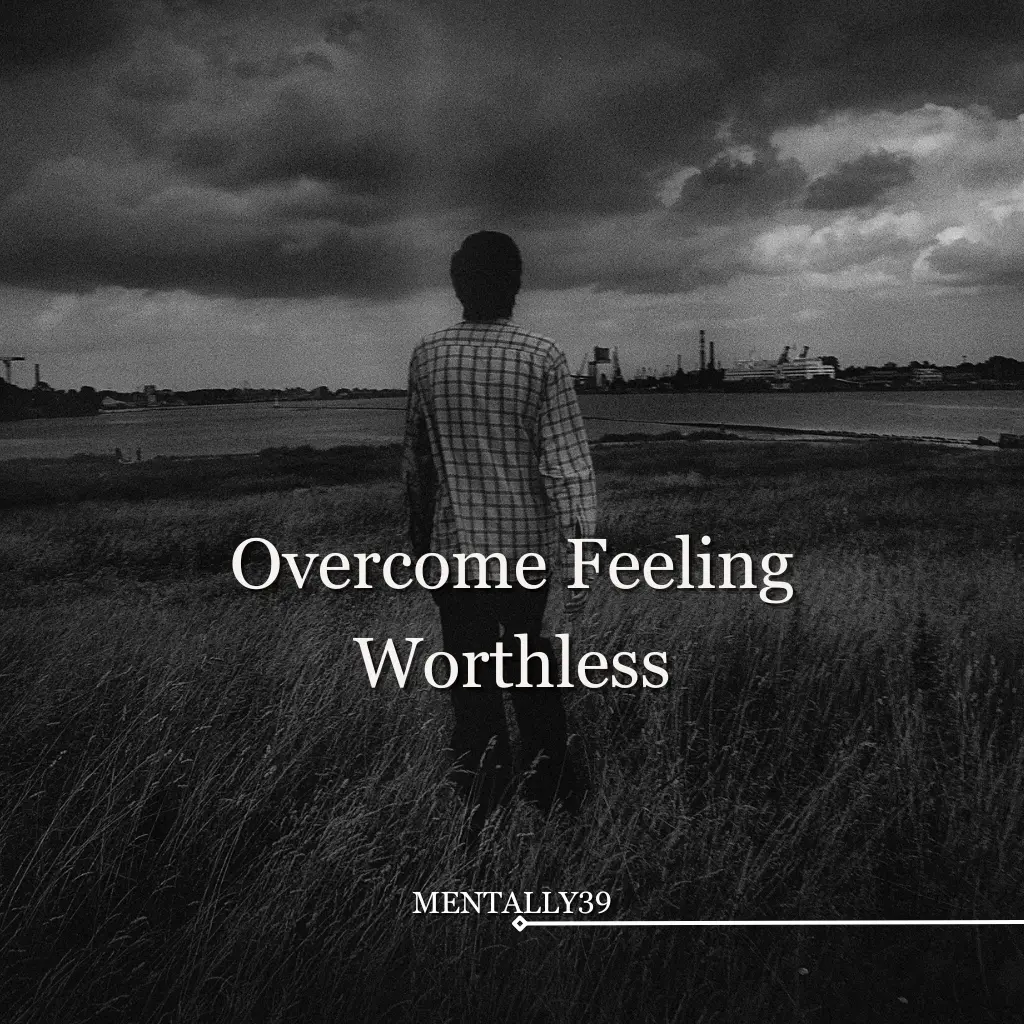Feeling worthless is a common experience that many people go through at some point in their lives. It can be debilitating and have a significant impact on our mental health and overall well-being.
However, it’s important to remember that you are not alone in this struggle; there are ways to understand and overcome this feeling of worthlessness, which may be a sign of underlying mental health issues like depression.
By recognizing that feeling worthless is a common symptom of depression and other mood disorders, we can seek support and take steps toward healing.
I have gone through these feelings myself. For years, I felt worthless; I had low self-esteem and a major depressive disorder. In this article, we will explore the causes of feeling worthless, coping strategies, and steps you can take to improve your self-worth and regain your confidence.
What are the common causes of feeling worthless?
Common causes of feeling worthless and hopeless can include past traumas, low self-esteem, negative thought patterns, comparison to others, lack of purpose, or constant criticism. Recognizing these triggers is the first step towards overcoming feelings of worthlessness and building a healthier self-image.
The Connection Between Worthlessness and Depression
Experiencing feeling worthless can often accompany symptoms of depression. According to the American Psychological Association (APA), “feelings of guilt or worthlessness” are common signs of depression.
It’s important to recognize that these feelings do not reflect your true worth but rather a symptom of an underlying mental health condition. Seeking professional help, such as therapy or counseling, can provide valuable support in managing and overcoming these feelings.
The Vicious Cycle of Negative Self-Talk
The way we talk to ourselves can significantly impact our feelings of self-worth, and negative self-talk is a major contributor.
I was constantly criticizing myself and focusing on what I thought were flaws and failures. Continuous thinking like this reinforces the belief that we are unworthy.
This negative thought pattern can cause you to feel like you are in a never-ending cycle; this thinking can affect a person’s self-esteem and overall mental well-being. Becoming aware of our negative self-talk and challenging these thoughts is essential in breaking free from this cycle.
Reasons for Feeling Worthless
Childhood Trauma and Its Impact on Self Worth
Childhood experiences, particularly traumatic ones, can deeply influence our sense of self-worth. Suppose we were subjected to emotional abuse, neglect, or constant criticism during our early years. In that case, it can shape our beliefs about ourselves.
These negative beliefs, developed when we were kids, can contribute to feeling worthless, insignificant, or anxious. Understanding the impact of childhood trauma and seeking professional help can assist in healing and rebuilding self-worth.
External Factors and Societal Pressure
External factors, such as what society expects and peer pressure, can also contribute to feelings of uselessness. Comparing ourselves to others, striving for unrealistic standards, and seeking validation from external sources can undermine our self-esteem.
Recognizing and challenging these societal pressures is essential in developing a healthy sense of oneself that is not dependent on external validation. It’s okay if you don’t get a gazillion views on Instagram or TikTok.
Cultivating Self-Compassion and Self-Acceptance
Practicing self-compassion and self-acceptance is a powerful tool for when you are feeling worthless. Recognize that everyone has flaws and mistakes; it’s part of being human.
Treat yourself with kindness, as you would a close friend, and acknowledge your worthiness in spite of your perceived shortcomings.
Would you talk to a friend the way that you talk to yourself? Embrace self-care practices, such as mindfulness, meditation, and self-reflection, to foster self-compassion and self-acceptance.
Challenging Negative Thoughts and Core Beliefs
Negative thoughts and core beliefs are at the core of feelings of unimportance. Sometimes, we might have thoughts that make us feel insignificant.
However, it’s important to question whether those thoughts are true and find evidence that proves them wrong. This thinking can help us feel better and more positive.
Cognitive-behavioral therapy (CBT) is an effective therapeutic approach that helps individuals identify and replace negative thinking patterns with more positive and realistic ones.
Seeking the guidance of a mental health professional trained in CBT can provide valuable support in challenging and reframing negative thoughts.
Building a Supportive Network
Surrounding yourself with a supportive network of friends, family, or support groups can make a significant difference when feeling worthless sets in. True friends will be there to support you.
Seek out individuals who uplift and encourage you, and limit interactions with those who trigger negative feelings or reinforce your insecurities.
Support groups, both online and offline, can provide a safe space to share experiences, gain insights, and receive support from individuals who have faced similar challenges.
Engaging in Meaningful Activities and Pursuits
Engaging in activities that bring you joy and a sense of accomplishment can help boost your self-esteem. Explore hobbies, interests, and passions that align with your values and provide a sense of purpose.
It’s important to find ways to express how you feel and make a positive impact on the lives of others. Find things that let you express your feelings. Maybe it’s art, music, writing, or exercising. But find something. There are many ways to improve yourself; for me, journaling and exercise were and still are my outlets.
Get Help -Therapy as a Path to Healing
Therapy can be a valuable resource in understanding and overcoming feelings of worthlessness. Professional counseling can provide a safe and non-judgmental space for you to explore the underlying causes of your worthlessness and develop coping strategies.
There are many different therapeutic methods that can be utilized based on your requirements and objectives. Some forms of psychotherapy include cognitive behavioral therapy (CBT), dialectical behavior therapy (DBT), or psychodynamic therapy. There are many types of therapy; research and find the right style for you.
Medication and Treatment Options
In some cases, medication may be prescribed to manage symptoms of depression or other underlying mental health conditions contributing to feelings of worthlessness, including specific traumatic or stressful events.
A mental health professional can assess your situation and recommend appropriate medication options if necessary. It’s important to note that medication should be used in conjunction with therapy and under the guidance of a qualified healthcare provider.
Helplines and Support Organizations
Helplines and support organizations can provide immediate assistance if you are in an immediate crisis or need someone to talk to. The 988 Suicide & Crisis Lifeline and the National Domestic Violence Hotline (800-799-7233) are vital resources for individuals experiencing suicidal thoughts or domestic abuse, including suicidal ideation. These helplines offer free and confidential support 24/7.
Organizations like BetterHelp and Regain also provide online therapy options for people looking to get help from professionals. I myself have used the crisistextline.org Just Text HOME to 741741 to reach a volunteer Crisis Counselor.
Just seek help and find a therapist to help you overcome feeling worthless; you are not worthless or alone. You have a lot going on in your life; take a few minutes and text or chat with someone when you are experiencing symptoms of depression.
Online chat can be a convenient way to connect with a professional and receive support during difficult times in your own life. Helplines and support organizations are also available for those struggling with feelings of hopelessness and worthlessness.
Embracing Your Thoughts and Feelings
Remember that each person’s emotional health is unique, and comparing yourself to others is unproductive. Embrace your strengths, accomplishments, and personal growth, no matter how small they may seem.
Acknowledging your accomplishments and recognizing the value of your journey toward discovering yourself is important. Don’t forget to give yourself credit and stay committed to the path you have chosen for yourself. Keep pushing forward and always believe in your abilities.

Setting Realistic Goals and Expectations
Setting realistic goals and expectations is crucial in building self-value. Break down larger goals into smaller, achievable steps and celebrate each milestone along the way.
Establishing realistic goals and expectations is one of the most important steps in developing a strong sense of self-assurance. When we set achievable targets for ourselves, we are more likely to experience success and avoid feelings of disappointment or frustration.
By taking the time to carefully define our objectives and create a plan for achieving them, we can build confidence in our ability to accomplish great things. This can help us overcome obstacles and navigate challenges with greater ease, ultimately leading to a more fulfilling and satisfying life.
Practicing Gratitude and Mindfulness for Mental Health
It’s understandable to feel down sometimes, but one of many ways to manage is to practice gratitude and focus on the present moment. Take a moment to appreciate the good things in your life.
Try to let go of any negative thoughts that may be weighing you down. Journal your thoughts, keep post-it notes around, and write down positive experiences and affirmations. You could place them on the fridge or in a gratitude jar. Take a walk outside and really notice the beauty that is around you. Practicing gratitude and mindfulness, including positive affirmations, can greatly improve mental health and energy levels.
Remember that you are not alone, and people do actually care about you. Take time each day to reflect on things you are grateful for and engage in mindful exercises to ground yourself in the present. This can help counter negative thoughts and promote a more positive mindset.
Embracing Self-Care and Well-Being
Prioritizing self-care and well-being is essential in nurturing oneself. Engage in activities that promote physical, mental, and emotional well-being. This can include getting enough sleep, maintaining a balanced diet, exercising regularly, and engaging in activities that bring you joy and relaxation.
Even if you have to start out small, do it. Take a shower and clean one room in your house or apartment. Maybe take that 15-minute walk in nature and practice being thankful for the little things that bring you peace and calmness, helping to alleviate feelings of anxiety.
Celebrating Progress and Seeking Support
Remember that overcoming feelings of worthlessness is a journey, and progress takes time. Celebrate even the smallest victories along the way and acknowledge your growth.
Seek support from loved ones, friends, or professionals whenever you need guidance or encouragement. If you have a serious mental health condition, it might be time to go to the hospital.
Again, you are not alone, and with the right mental health support, you can overcome feelings of worthlessness and cultivate a stronger sense of self-value.
In conclusion, feelings of worthlessness can be challenging but not impossible.
By understanding the underlying causes, seeking professional help, and implementing coping strategies, you can overcome these feelings and cultivate a healthier sense of self-worth. Remember, you are valuable, deserving of love and respect, and capable of achieving happiness and fulfillment in your life.
20+ Years as a Special Education Teacher
NASM Certified Nutrition Coach,
Certified Trauma Informed Trainer
Mindset and Motivation Master Life Coach
